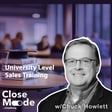
Unlocking Potential in Sales Teams w/Maria White
In this episode, Brian Dietmeyer talks to Maria White, co-founder of Good Morning Enablement, about high-performance sales teams and the transformative strategies implemented at HP. They explore the challenges and methodologies involved in reshaping sales teams to adapt to market changes and acquisition growth. This insightful discussion delves into evidence-based transformation, productivity coaching, and the significant impact of strategic enablement on sales efficiency and competitiveness.
Timestamps:
00:03 Introduction to the episode and guest Maria White.
01:06 Discussion on high-performance sales teams begins.
03:06 Maria explains the competitive challenges and market share issues at HP.
05:30 Diagnostic processes used in sales transformation.
07:06 Maria shares findings from the sales team diagnostics.
09:22 Introduction of productivity coaching and its impact on sales teams.
12:23 How productivity coaching differs from traditional methods.
15:38 Maria explains the personal and individual focus of productivity coaching compared to deal pursuit teams.
19:31 Challenges and common pitfalls in launching sales transformations.
21:19 Closing thoughts and future outlook for Good Morning Enablement.













